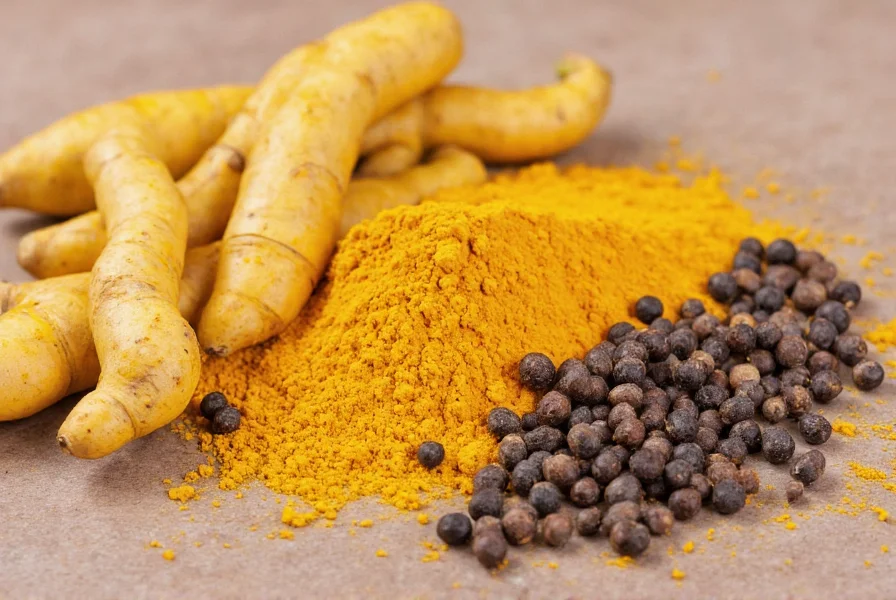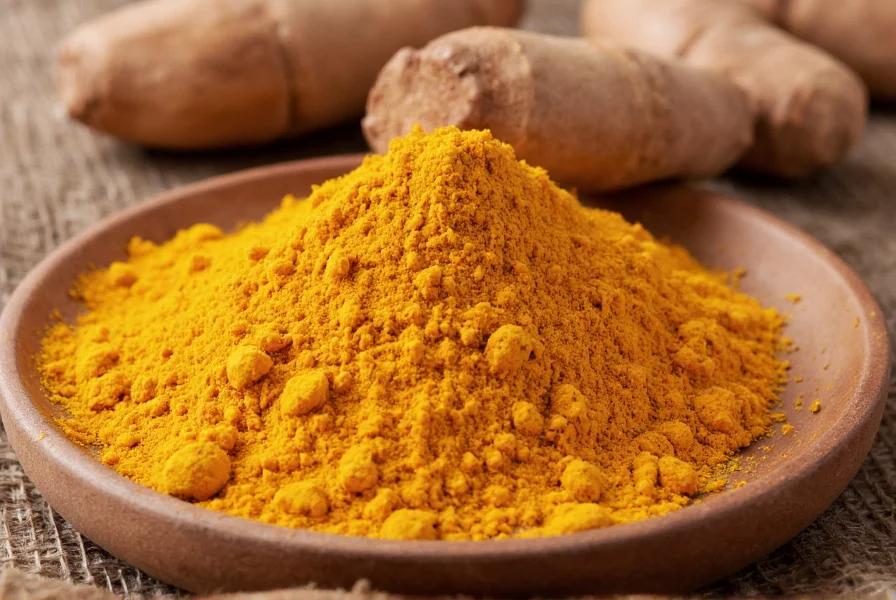For centuries, turmeric has been a staple in traditional Ayurvedic and Chinese medicine, but modern science is now validating many of its purported health benefits. This golden spice, derived from the Curcuma longa plant's root, contains curcuminoids—primarily curcumin—which account for most of its therapeutic properties. Understanding the evidence-based benefits of turmeric spice requires examining both the promising research and its practical limitations.
The Science Behind Turmeric's Power
Curcumin represents only about 3% of turmeric by weight, yet it's responsible for most documented health effects. This polyphenol works through multiple biological pathways, particularly by inhibiting molecules like NF-kB that trigger inflammation. However, curcumin has notoriously poor bioavailability—meaning your body struggles to absorb and utilize it effectively. This explains why how to increase turmeric absorption is crucial for experiencing benefits. Research shows combining turmeric with black pepper (which contains piperine) can boost curcumin absorption by up to 2,000%, making the classic golden milk recipe scientifically sound.

Key Evidence-Supported Benefits of Turmeric Spice
1. Powerful Anti-Inflammatory Effects
Chronic inflammation contributes to nearly all modern diseases. A 2022 meta-analysis in Nutrients found curcumin supplementation significantly reduced inflammatory markers like CRP and IL-6. In one clinical trial, 500 mg of curcumin twice daily decreased inflammation markers by 37% in people with metabolic syndrome—comparable to some pharmaceutical approaches but without adverse effects. This makes turmeric spice for joint pain particularly relevant, as multiple studies show reduced pain and improved function in osteoarthritis patients.
2. Enhanced Antioxidant Capacity
Curcumin neutralizes free radicals while stimulating the body's own antioxidant enzymes. A 12-week study published in Phytotherapy Research demonstrated that 1,000 mg daily of curcumin increased superoxide dismutase (SOD) activity by 27% and glutathione levels by 19% in healthy adults. These antioxidant properties of turmeric root may help protect against oxidative stress-related conditions including premature aging and neurodegenerative diseases.
3. Cognitive Function Support
Curcumin crosses the blood-brain barrier and may boost brain-derived neurotrophic factor (BDNF), a growth hormone for brain cells. In a double-blind, placebo-controlled trial with 60 adults, those taking 90 mg of curcumin twice daily for 18 months showed significant improvements in memory and attention tests compared to placebo. While promising, researchers caution that scientific evidence for turmeric benefits in cognitive health requires larger, longer-term studies.
| Benefit Category | Key Research Findings | Effective Dosage Range |
|---|---|---|
| Anti-inflammatory | 37% reduction in CRP markers | 500-1,500 mg curcumin daily |
| Antioxidant | 27% increase in SOD activity | 1,000 mg curcumin daily |
| Cognitive Support | Improved memory in 18-month trial | 90 mg curcumin twice daily |
| Joint Health | Reduced pain comparable to NSAIDs | 500 mg curcumin 2-3x daily |
Practical Considerations for Turmeric Consumption
Understanding the daily recommended turmeric dosage is essential for safe and effective use. Culinary turmeric contains only about 3% curcumin, so you'd need to consume approximately 15 grams (3 teaspoons) of turmeric powder to get 500 mg of curcumin—far more than typical dietary intake. This explains why most research uses standardized curcumin extracts. For culinary use, adding 1/2 to 1 teaspoon of turmeric to meals provides flavor and some benefits, especially when combined with healthy fats (like olive oil) and black pepper.
Safety Profile and Potential Concerns
Turmeric is generally safe when consumed in food amounts, but higher doses require caution. The potential side effects of turmeric consumption may include digestive upset at doses above 8 grams daily. More importantly, curcumin can interact with blood thinners, diabetes medications, and chemotherapy drugs. People with gallbladder issues should avoid high-dose turmeric as it may stimulate bile production. Pregnant women should stick to culinary amounts rather than supplements. Always consult your healthcare provider before starting high-dose turmeric supplementation, especially if managing chronic health conditions.
Maximizing Turmeric's Benefits in Your Diet
For those seeking the health benefits of turmeric root through diet rather than supplements, consider these evidence-based strategies:
- Combine with black pepper: Just 20 mg of piperine (about 1/20th of a teaspoon) significantly enhances absorption
- Add healthy fats: Curcumin is fat-soluble, so consume with olive oil, avocado, or coconut milk
- Apply gentle heat: Cooking turmeric briefly increases curcumin solubility
- Pair with quercetin-rich foods: Apples, onions, and berries may further boost bioavailability
While golden milk and turmeric lattes have gained popularity, a simple turmeric-ginger stir-fry or adding the spice to soups and stews provides more practical daily incorporation. Remember that consistent, moderate consumption delivers better results than occasional high doses.
Realistic Expectations for Turmeric Benefits
Despite promising research, it's crucial to maintain realistic expectations about turmeric's effects. Most human studies use concentrated curcumin extracts (typically 500-2,000 mg daily), not culinary turmeric. The turmeric and black pepper combination is scientifically validated for improving absorption, but even then, dietary turmeric provides more modest benefits than supplements. Turmeric works best as part of a comprehensive healthy lifestyle—not as a miracle cure. Current evidence supports its role in reducing inflammation and oxidative stress, but more research is needed to confirm specific therapeutic applications.

Conclusion: Turmeric as Part of a Healthy Lifestyle
Turmeric spice offers genuine, science-backed health benefits primarily through its anti-inflammatory and antioxidant properties. While culinary use provides modest benefits, those seeking therapeutic effects may require standardized curcumin supplements with enhanced absorption. The most compelling evidence supports turmeric's role in reducing inflammation and supporting joint health, with promising but less conclusive research for cognitive and cardiovascular benefits. As with any natural remedy, consult healthcare professionals before using turmeric for specific health conditions, especially if taking medications. When incorporated wisely into a balanced diet, turmeric remains a valuable culinary and wellness tool with centuries of traditional use now increasingly validated by modern science.
What's the most effective way to consume turmeric for maximum health benefits?
For maximum absorption, combine 1/2 to 1 teaspoon of turmeric with black pepper (providing piperine) and a healthy fat like olive oil or coconut milk. Research shows this turmeric and black pepper combination increases curcumin absorption by up to 2,000%. Cooking turmeric briefly in liquid also enhances solubility. While culinary use provides benefits, therapeutic effects typically require standardized curcumin supplements (500-2,000 mg daily) with enhanced bioavailability formulations.
How much turmeric should I take daily for inflammation reduction?
Studies showing significant anti-inflammatory effects typically use 500-1,500 mg of curcumin daily. Since turmeric contains only about 3% curcumin by weight, this would require 15-50 grams of turmeric powder—far more than culinary use provides. For dietary consumption, aim for 1/2 to 1 teaspoon (2-4 grams) of turmeric daily in cooking, always paired with black pepper and healthy fats. For therapeutic anti-inflammatory properties of turmeric, consider standardized curcumin supplements with piperine after consulting your healthcare provider.
Can turmeric interact with medications I'm currently taking?
Yes, turmeric (particularly in supplement form) can interact with several medications. Curcumin may enhance the effects of blood thinners like warfarin, increase the risk of hypoglycemia when taken with diabetes medications, and potentially interfere with chemotherapy drugs. It may also increase stomach acid production, affecting medications for acid reflux. If you take any prescription medications, especially blood thinners, diabetes drugs, or chemotherapy agents, consult your healthcare provider before starting high-dose turmeric supplementation. Culinary amounts (1/2-1 teaspoon daily) are generally safe for most people.
How long does it take to notice benefits from regular turmeric consumption?
Most clinical studies showing measurable benefits from turmeric use a minimum of 4-8 weeks of consistent consumption. For inflammation reduction, some people report symptom improvement within 2-4 weeks of daily supplementation (500-1,500 mg curcumin). However, research indicates that maximum benefits for conditions like osteoarthritis typically require 8-12 weeks of consistent use. Culinary consumption provides more subtle, long-term benefits that accumulate over months rather than weeks. Individual responses vary based on health status, dosage, and absorption factors.
Is there a difference between fresh turmeric root and powdered turmeric in terms of health benefits?
Both forms offer benefits, but fresh turmeric root contains slightly higher curcumin levels (about 3-4%) compared to dried powder (2-3%) due to moisture loss during processing. Fresh root also contains volatile oils with additional therapeutic compounds not present in powder. However, powdered turmeric is more concentrated by volume—1 teaspoon of powder equals about 1 inch of fresh root. For maximum health benefits of turmeric root, both forms work well when combined with black pepper and healthy fats. Fresh root may offer marginally more benefits, but convenience often makes powder the practical choice for regular use.











 浙公网安备
33010002000092号
浙公网安备
33010002000092号 浙B2-20120091-4
浙B2-20120091-4